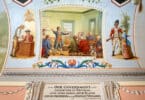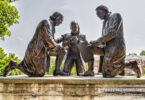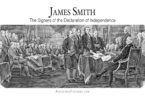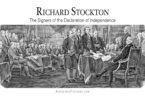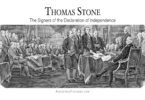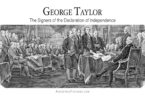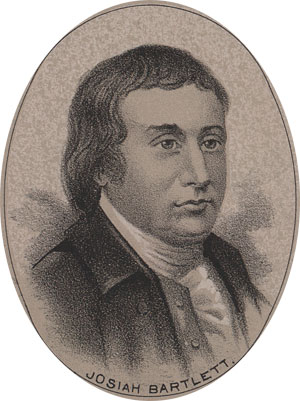
Josiah Bartlett was one of the signers of the Declaration of Independence. While not a Revolutionary War celebrity, Bartlett is, nonetheless, still pretty well known to those who study history. In fact, he was included as a character in the musical 1776.
Born in Amesbury, Massachusetts to Stephen Bartlett and Hannah Webster, Josiah was the fifth child and fourth son of his parents. Also, he was well-educated. His parents made sure of that. He learned Greek and Latin as a child, When he was still in his teens, Josiah began studying medicine and working in a physician’s office. Before he was twenty-one years old, he had moved to Kingston, New Hampshire, and started his own medical practice. Josiah Bartlett was definitely a high achiever.
At the time he moved to Kingston, Josiah was the only physician in that part of the state at the time. He made a home for himself there and bought land and a farm. He also located a bride for himself and married Mary Bartlett in 1754. Mary was his first cousin, the daughter of his uncle, so her maiden name was the same as his surname. Together, the happy couple had ten children, eight of whom lived past childhood.
All three of Josiah’s sons and seven of his grandsons followed in his footsteps and became physicians.
Josiah became well enough known and respected in Kingston that he began to become involved in political issues in the town, and then the colony. He was elected to the colonial assembly in 1765 and became colonel of New Hampshire’s colony militia in 1767. He was also appointed a Justice of the Peace the year he became a colonel.
Josiah’s politics were decidedly of the Whig nature, which put him in opposition to the colony’s governor near the time of the American Revolution. Their opposition to each other does not seem to have become too antagonistic. As the colonies moved toward revolution against Great Britain, Josiah joined the Masons and wrote a letter to one of his sons asking him to consider joining them, as well.
Josiah joined the colonial assembly’s Committee of Correspondence. In this position, he was able to work with the leaders of the other colonies in their revolutionary endeavors. When the governor of New Hampshire dismissed the assembly, Josiah was elected the leader of a new and illegal assembly to continue doing the revolutionary work of the men who were in it. They called the new group the Provincial Assembly.
During this time, Josiah’s house was burned to the ground. While the true cause was never determined, it was supposed at the time that this was the work of opposition forces who were loyal to Great Britain. Josiah moved his family out of town and into their farmhouse in the country. While his family was safely housed once more, he began rebuilding their house in town. While rebuilding his house, the Provincial Assembly chose Josiah and John Pickering as delegates from New Hampshire to the Continental Congress in Philadelphia. Josiah declined the appointment because he knew his family needed his attention while he rebuilt their house. Josiah stayed in New Hampshire and was still active in its revolutionary politics.
When the governor of the colony was expelled from New Hampshire in 1775, one of the last things he did before having to leave the colony was to revoke Josiah’s Justice of the Peace appointment.
Josiah was selected as a delegate to the Continental Congress again shortly after his Justice of the Peace appointment was revoked. This time, he did attend, and attended into 1776, as well. There was a brief period of time when he was the only delegate from New Hampshire attending the Congress. At the Continental Congress, Josiah served on committees for Safety, Munitions, Secrecy, Marine, and Civil Government.
He continued writing letters to New Hampshire for the Provincial Assembly, telling them about what was going on at the Continental Congress. New Hampshire eventually sent two more delegates there to join him, Matthew Thornton and William Whipple. Congress officially brought up the issue of declaring independence from Great Britain in 1776, and Josiah was the first one there to be asked his opinion. This was because he was the senior representative from the northernmost colony. Josiah answered that he approved of declaring independence. Not long after that, the Declaration of Independence was written, and Josiah signed it.
Josiah went home on a break from the Congress after signing the Declaration and did not return when he was re-appointed the next year, citing fatigue as the reason. There had been much important work done at the Congress, and he needed a break. Yet, he made himself available to the Revolutionary cause. When called upon to do so, he went with John Stark’s military forces to the Battle of Bennington to give the troops the benefit of his medical skills.
After the American Revolution, Josiah continued to be active in politics in New Hampshire, holding a variety of both elected and appointed offices. In addition, he also worked at his medical practice until he decided to retire. When he did retire, it was to his old, familiar home in Kingston, the one he re-built. His wife Mary died in 1789. Josiah himself died in 1795 at his Kingston home. The official cause was paralysis, probably caused by a stroke. He is buried next to his wife at the Plains Cemetery in Kingston. The home he built in Kingston still stands, and descendants of his still live in it. The house was declared a National Historic Landmark in 1971.
There are other monuments to this brave signer of the Declaration of Independence in New Hampshire. The town of Bartlett, New Hampshire, located just north of Conway, is named for him. There is also a Josiah Bartlett Elementary School on the primary road of the town of Bartlett. Josiah is honored on a historical marker on New Hampshire Route 111 in Kingston. In Amesbury, Massachusetts, where he was born, there is a bronze statue of Josiah in the town square, and the Bartlett School that operated for nearly a century is now operated as the Bartlett Museum.

